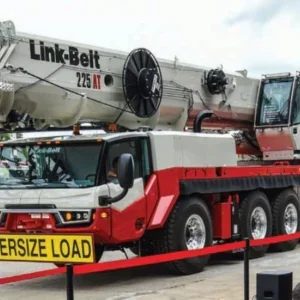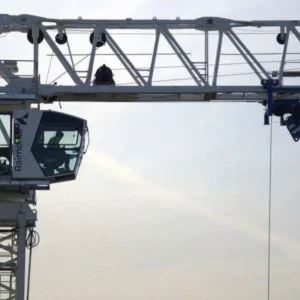
Left to right: finance md, Mario Trunzer; production md, Hubert Hummel; design md, Ulrich Hamme; sales md, Hans-Georg Frey.
MT: “Liebherr Ehingen is not a one-man show. We will continue with the way we went before. We are four managing directors: Hubert Hummel for production, Ulrich Hamme for design, I am finance, Frey is sales. I have been at Liebherr for 17 years, and at Ehingen for five years.
“There is no CEO at Ehingen, that is not Liebherr-like. We are managers at the same level, and all decisions have to be found in common. There is not one guy defining the strategy. We define the strategy together.
“It is not planned that I will become the sales director. We look for a successor. We consider all options, a manager from outside or someone from the Liebherr Group. The position will be filled maybe by the end of the year. I don’t know when. You have to look for somebody, and then have to look for when he is available. It is our intention to find a solution quick, but even if it is next year, that is no problem.
“The team is there, the is leadership there, the management is there, we have no problem with the situation. Our customers rely on a continuing partnership as it was in the past, it will be in the future.”
WD: Would someone new bring their own culture to the business?
MT: “That is not accepted. We have our Liebherr culture. He has to fit into Liebherr culture. This company is family owned, and we have our culture. He has to accept it, and he will accept it, this is Liebherr. This is not like a stock-owned company where somebody comes in and completely changes the way it goes: this will not happen.
WD: Mr Frey, Why are you leaving?
H-GF: “This CEO position, in a company of 10,000 people, for me is a very interesting challenge in this new environment, and that’s the sole reason. The question is rightly asked because I am working for best crane company in the world, with a fantastic team, product and fantastic owners, who give the company so much support.
“We do have a CEO position in Liebherr, but it’s Mr Liebherr. Where I am today is where I will be until I retire.
“I was not on the market. I was not out there searching for a job, I was headhunted, I had no intention to leave Liebherr. In Germany, there are not so many public companies, and there are not so many CEO positions in public companies, so this is a big step in my personal career.”
WD: You are not the only one. Earlier this year, Helmut Limberg, managing director, sales, of the Liebherr tower crane business (Liebherr Biberach), also left the company to start a new job at Jungheinrich.
H-GF: “It is only a coincidence. It is a public company, but the voting stock is held by two families. Jungheinrich still has a family background, so this is obviously why it was looking for people from this environment. Liebherr is not buying Jungheinrich.”
WD: What problems will your successors face?
H-GF: “The main question will be when will this boom be ending. There are really two questions: when is the turning point for business, and how fast will it go down. I am not saying that there will be a problem, but there could be a problem.”
WD: Do manufacturers have a responsibility to limit the sale of machines so that in a slow-down an overabundance of machines will not destroy rental rates?
H-GF: “Rental rates are the business of the customer, not the business of the manufacturer. We are trying to fulfill the customer expectations relating to delivery of machines when they need them. This has become a big problem today because demand is so strong that even if we significantly increase production we cannot meet the demands of the market.”
MT: “Steel is the problem and tyres. We are not the limiting factor. We cannot increase production more.
“Nobody has forseen this boom. Obviously this is a cyclical business. We take a long-term view. Maybe if it is cyclical in the future, it will go back a little bit, but in the long term, we see an increase, because there is a worldwide need for infrastructure. The mobile crane can be used in so many different markets.”
H-GF: “Also, we cannot give all of our cranes to a few customers. We want to meet the needs of our smaller customers.”
WD: How much have you increased prices?
H-GF: “Prices have increased about 6% over the last two years. We have increased our prices only in line with our own cost increase, relating to raw material and personnel.
“The situation in the used crane market is very strange. There are prices being paid for used machines, it’s outrageous, but this is a market situation, this is why I say that Liebherr has been very fair with pricing policy of new cranes, this is why new cranes are the best buy in the industry, if you can get one – the problem is that you can’t.”
Left to right: finance md, Mario Trunzer; production md, Hubert Hummel; design md, Ulrich Hamme; sales md, Hans-Georg Frey. Liebherr Ehingen managing directors






